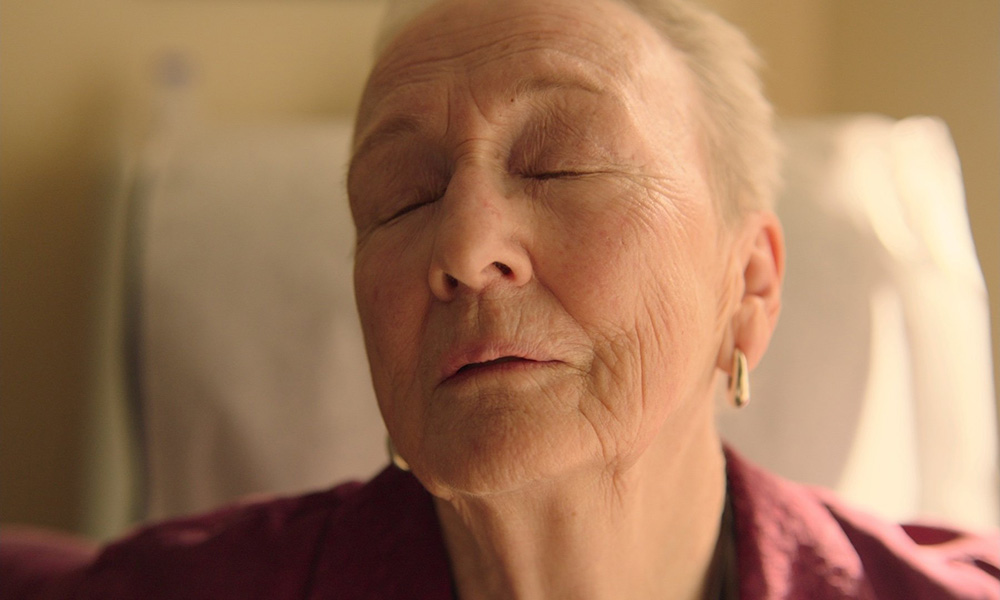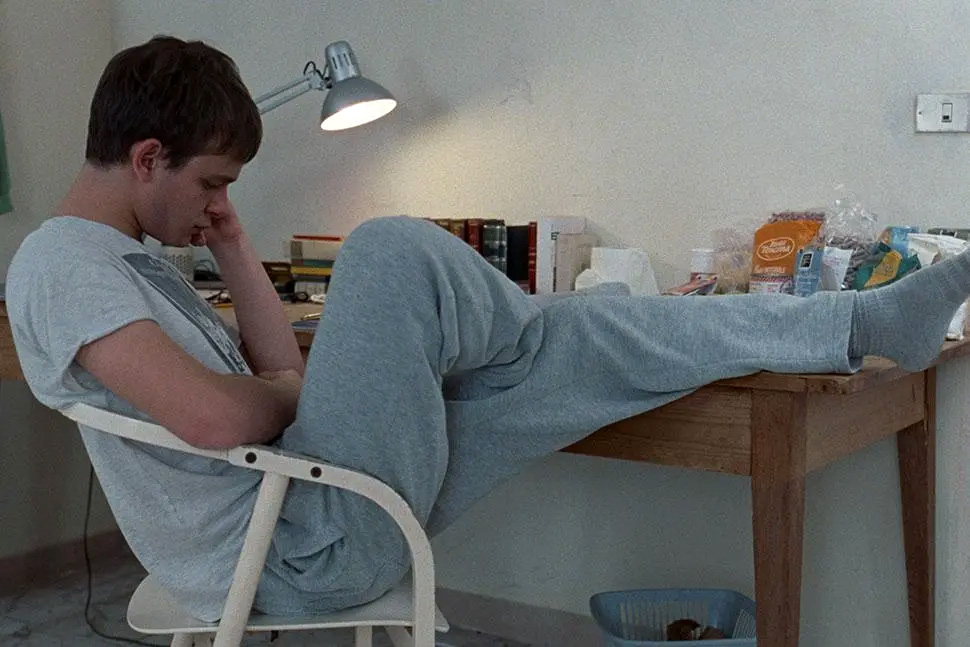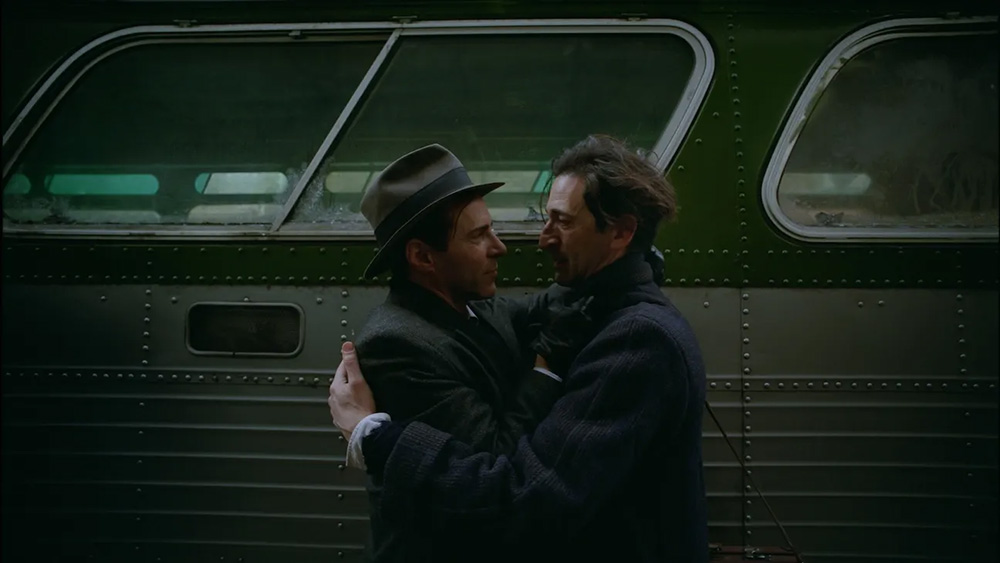The Venice film festival’s flagship buildings, the Palazzo del Cinema and the Palazzo del Casinò, were built in 1937 and 1938 respectively, the one resembling a cheerily grand cruise-ship pulling in, the other a starkly beautiful travertine edifice that would fit right into The Conformist (1970). Which meant that The Brutalist (2024, pictured at top), Brady Corbet’s celebrated film about a Hungarian Jewish architect forced into exile in postwar America, screened for thousands in a suitably imposing setting (which owes its existence to Fascist-era Italy). In a movie that keeps subverting its own myth-making momentum, Laszlo Toth (Adrien Brody) designs a monumental community complex at the behest of a Pennsylvania magnate (Guy Pearce) who learns of his Bauhaus creations back in Hungary. What you might not glean from triumphal tweets about The Brutalist is how broken Toth is; this isn’t the story of a striver, but someone puttering along, missing his absent wife (Felicity Jones), until this surprise commission gives his artistic soul a grand stage. Corbet’s primary mode is “momentous,” chugging along with Daniel Blumberg’s score, the VistaVision images rich and brawny, a terrific Brody’s hangdog face wonderful to watch.

The Brutalist screened in a prime Saturday night slot for critics (who counted down along with minutes ticking by on the intermission screen). Perhaps April (2024) could have received a similar showcase rather than screen much later in the festival? Dea Kulumbegashvili’s authoritative second feature stays close to OB-GYN doctor Nina (Ia Sukhitashvili of Kulumbegashvili’s Beginning, 2020) who performs abortions illegally in the Georgian countryside; within minutes of the film’s opening, she’s in trouble at her hospital after her patient dies in childbirth. It’s a bravura study of someone driven deeper into a personal abyss, both ethereally haunting and grittily real, shot by her talented longtime cinematographer Arseni Khachaturan, who can work in incredibly low light, like when Nina goes on a drive cruising for a lover. The film’s first five sequences each do something wildly different with the camera, including an enigmatic visionary shot of a hunched, aged metaphorical figure of sadness who reminded me of William Blake’s The Flea. Nina’s eventual trip to help a pregnant, possibly abused teenager on a farm suggests a portrait in rural despair and misogyny, but the truth is that her position of authority doesn’t totally protect her either. Kulumbegashvili’s script is dotted with stop-short lines: “There are days I miss you like I miss my childhood.”
April and The Brutalist belie popular coverage of Venice as an awards-season staging ground. The 2024 competition did have Angelina Jolie playing the idea of a diva in Pablo Larraín’s Callas biopic Maria (2024), but that was the exception. There was also Maura Delpero’s Vermiglio (2024), a luminously shot wartime micro-portrait of a sprawling family in the Italian Alps and a daughter who gets pregnant; or the quicksilver pop of Halina Reijn’s Babygirl (2024), pitting Nicole Kidman and Harris Dickinson in office power plays over sexual politics and pleasures (and boldly asking, “What if there wasn’t a narrative agenda?”); or Sarah Friedland’s sensorily immersive portrait of a take-charge cookbook writer with dementia, Familiar Touch (2024), starring a truly wizardly Kathleen Chalfant; or Alex Ross Perry’s Pavements (2024), a multitrack hybrid music film that evokes the pastiches and humor of the band itself. All that and a conventional but revealing documentary about Jerry Lewis’s The Day Clown Cried (1972), albeit with the incredibly underwhelming title Darkness to Light (2024), featuring a lengthy 2017 interview with Lewis and swaths of jaw-dropping film excerpts of him goofing off for kids in a concentration camp and delivering po-faced dialogue. The tightly packaged documentary (with an amusingly tone-deaf off-the-rack TV-ready score) not only clarifies why production stopped—a producer abandoned them without renewing the option to the source material or securing enough funding—but also draws parallels between the film’s clown, who fears his best days are over, and Lewis circa 1972.

People will probably hear enough about Pedro Almodóvar’s The Room Next Door (2024, a long goodbye story which I liked sitting with, as did the jury that gave it the Golden Lion) or even Kiyoshi Kurosawa’s Cloud (2024, the wonderfully disturbing parable of an internet reseller marked for death and dissolution). So how about Giovanni Tortorici’s Diciannove (2024, Italian for “Nineteen”) and its gnarly antihero, a kid from Rome who goes to London for school, then doubles back to study literature in Milan and circle the drain! Come for the off-putting introduction to the handsome Leo (Manfredi Marini) horking out a nose-bleed clot; stay for his overconfident ruminations on Dante scholarship and the anomie and squalor of his confused self-exile—a cure for the common coming-of-age tale. Also underreported from Venice is the latest concoction from the Quay Brothers, their adaptation of the Bruno Schulz fantasia Sanatorium Under the Sign of an Hourglass. Nineteen years in the making, it’s a kaleidoscope of black-and-white tableaux glimpsed through peepholes at an establishment at the foot of the Carpathian Mountains. The film’s mix of live-action performers and subtly gestural puppetry has the feel of ghostly machinery that can stop and start time at will, aided by distortions, looping, and the enveloping soundscapes of Timothy Nelson’s score.
Usually the encomiums of awards ceremonies can sound pat, but when jury president Isabelle Huppert proclaimed, “I have good news for you: cinema is in great shape,” I was happy to nod along on the strength of the Kulumbegashvilis and the Friedlands and the Quays and the Kurosawas, pushing cinema into a wild array of realms even when we think we know where we’re going.



